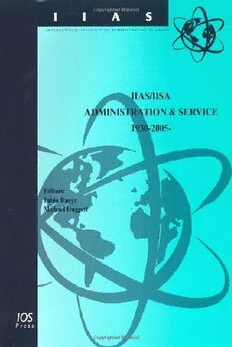
IIAS IISA Administration & Service 1930-2005- (International Institute of Administrative Sciences Monograph) PDF
120 Pages·2005·1.046 MB·English
Most books are stored in the elastic cloud where traffic is expensive. For this reason, we have a limit on daily download.
Preview IIAS IISA Administration & Service 1930-2005- (International Institute of Administrative Sciences Monograph)
Description:
75 years is a remarkable lifetime for any institution, especially if one considers the impressive changes that public administration has undergone. The ICT revolution has radically altered the way public administration operates. Also the traditional design of bureaucratic organizations has been seriously reshaped because of a communicational flow that is intense and pervasive as never before. But the most intriguing change affecting public administration is the world-wide battle for democracy and political participation. Later, the issue of globalization and the growing mismatch between governments, legal frameworks, territories and communities came into view. This publication consists of six essays; the first gives us a general account of the history of the Institute; the second describes the evolution of the governance, the membership, and the activities of the IIAS. Essay three reconstructs the international dimension of the Institute's life from its earlier stage to World War II. Essay four is about the relation between IIAS and that sphere of knowledge which has been termed 'administrative sciences'. The fifth essay focuses on the special relationship between the IIAS and Brussels. The final essay traces the main lines of the recent history of the Institute, projecting those lines into the coming years. Altogether the six chapters bring fresh information and new appreciation about the history of IIAS and offer reliable material to work at an explanation of the history of this institution, notably for its capacity to continuously adjust itself to a deeply changing world, to overcome crises and even to recover from lethal attacks.IOS Press is an international science, technical and medical publisher of high-quality books for academics, scientists, and professionals in all fields. Some of the areas we publish in: -Biomedicine -Oncology -Artificial intelligence -Databases and information systems -Maritime engineering -Nanotechnology -Geoengineering -All aspects of physics -E-governance -E-commerce -The knowledge economy -Urban studies -Arms control -Understanding and responding to terrorism -Medical informatics -Computer Sciences
See more
The list of books you might like
Most books are stored in the elastic cloud where traffic is expensive. For this reason, we have a limit on daily download.
